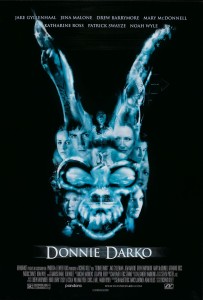
“You have to watch this movie!” Marjorie exclaimed.
I had just returned home from a very late night at work. I was exhausted and had no idea what she was talking about.
“Donnie Darko. You have to see it,” she told me. “It was on TV tonight. It’s great, but I have no idea what the hell it’s about.”
That, in 2003, was my introduction to Richard Kelly’s directorial debut, Donnie Darko.
I had heard about Donnie, but only in passing. I never knew of its release in 2001; a movie that featured a plane engine crashing into a house was a tough sell just a few weeks after the September 11 attacks on New York City.
The film did catch my eye the following year after it was released on DVD. The title repeatedly popped up at Bloody-Disgusting.com, one of my favorite horror movie websites. Wedged between news articles about Jason X and Bubba Ho-Tep, films for which I had built-in interest, it took several mentions of Darko for me to click the links and read the articles. When I finally did I was confused and slightly put off by the descriptions of a man in a giant bunny suit — I envisioned very low budget, low rent horror from a film with a ghostly bunny.
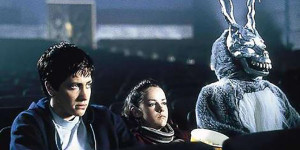
Three’s a crowd when Frank the Bunny comes on your date.
Marjorie’s enthusiasm that night and the online buzz I continued to read convinced me to rent the DVD immediately. I expected straight-up horror, perhaps with a guy in a rabbit suit killing random people.
That was not what I got. Not by a long shot.
First, I wasn’t sure why a website devoted to slasher and horror features spent so much time covering Donnie Darko, which I view as a dramatic sci-fi film. The story invokes concepts of time travel, parallel universes, and psychic phenomena; all delivered in an oblique, theoretical fashion.
When credits rolled I shared my wife’s enthusiastic reaction, but I understood it no better than she did. We talked for hours that night, debating the possible meanings of what we just saw.
What I knew, I knew for a solid fact, was that Donnie Darko was a period-piece teen film. Set in 1988 the story revolves around troubled teen Donnie Darko (Jake Gyllenhaal). On the surface his life looked perfect; he lived in a big house in Virginia, his parents were still together, his older sister was about to enroll in Harvard, and his younger sister was part of the successful dance troupe Sparkle Motion. Yet Donnie is a misfit, full of angst and despair, fighting with all of his family members. He also has weekly therapy sessions where he discusses his sexual fantasies and his fear of being alone.
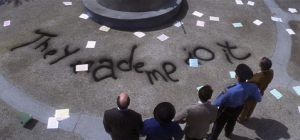
…but who are “they”?
Donnie is smart, his test scores are described as “intimidating”, but at school he has only a small group of friends that discuss nothing more important than the sexual preferences of Smurfs. Early in the film Donnie starts dating the new girl in school, Gretchen Ross (Jena Malone), his first real connection with anyone.
There are some teachers with whom Donnie gets along very well, including science teacher Dr. Monnitoff (Noah Wyle) and English Literature teacher Miss Pomeroy (Drew Barrymore, who also served as executive producer). Both are younger and freer to have open dialogue with their students.
Then there is older health teacher Mrs. Farmer (Beth Grant), an activist who rails against Pomeroy’s teaching of Graham Greene’s short story “The Destructors.” Farmer pushes the school to teach morality based upon the works of motivational speaker Jim Cunningham (Patrick Swayze), who believes everything in life is a choice between love and fear.
Donnie rails against this reductive philosophy, increasing his parents’ view of him as a troubled child.
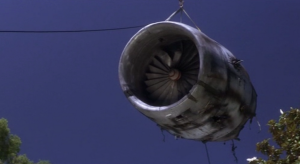
Deus ex machina…a literal God machine.
Taken just as the above, this movie feels like a throwback to classic John Hughes teen fare like The Breakfast Club or Pretty In Pink. It’s the standard tale of a high school student on the precipice of adulthood struggling for free thought in an environment that doesn’t foster such expression. The period-piece setting augments this feeling; the Bush/Dukakis election is referenced, Donnie’s mother reads Stephen King’s It, and the soundtrack features music by Tears for Fears and Duran Duran. There is a large aspect of Donnie Darko that plays just like one of those teen films, and could be taken as such.
But then there’s the jet engine, and Frank the Bunny.
Donnie is a sleepwalker; in the first scene in the film we find him waking up on a hill and riding his bike home. He appears to have been crying.
The next night he is called from his bed by a strange voice. Following it, he finds a man in a strange, dirty rabbit costume, wearing a twisted, frightening, metal bunny mask. This man is Frank, and he tells Donnie that the world will end in 28 days, six hours, 42 minutes, and 12 seconds. We’re not sure if Frank is real or a vision, but it saved Donnie’s life, as that was the night a jet engine crashed into the boy’s bedroom. Had Donnie been there he’d have been killed.
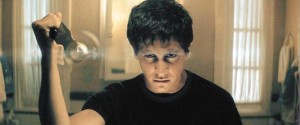
He has a knife in the bathroom. Is Donnie going Psycho?
Every time the film starts to settle into a predictable teen movie routine, something strange happens; Frank appears and gives Donnie destructive orders such as to flood the school or to burn down Cunningham’s house.
Donnie follows the orders, but the audience is left wondering what’s truly happening. Is Donnie a bad kid? Is he having a psychotic break? Is Frank a manifestation of Donnie’s insanity? If the latter is true, then what is with all the talk of time travel and parallel dimensions?
More, each of these bad acts lead to good ends. Flooding the school causes class to be cancelled, and in that free time Donnie first asks out Gretchen. Then, in the ashes of Cunningham’s home, a dungeon full of child pornography is discovered. It’s implied that Swayze’s character may be the head of a kiddie porn distribution ring, and Donnie’s arson helped put an end to it.
Slowly, Donnie becomes convinced that Frank is from the future and that Donnie himself can see future events. He discusses this with Dr. Monnitoff and is given a book, The Philosophy of Time Travel, which precisely details the strange things occurring in Donnie’s life.
Is this the case? Is Donnie insane? Is this all a dream in the character’s head? Is Donnie a stand-in for Jesus?
Simply put, the movie was a mind-fuck. When credits rolled I had no idea what I’d seen, but I knew I enjoyed it.
On Now Playing Podcast I’m often referred to as the critic who places the most importance on story, so it may be unexpected that many of my favorite movies are ones with incomprehensible plots. But I’ve also made it clear on the show that I often love to discuss films more than I love the films themselves. To me, the best movies are conversation starters — films that, as mentioned in True Romance, after watching you can go talk about over a slice of pie.
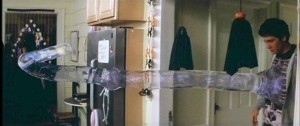
Is this telling Donnie where he will go, or determining his path? If Donnie hadn’t seen this vision would he still have walked this way?
The films need to have a hook; I don’t enjoy every overly dense, incomprehensible, artsy films. There must be some semblance of story, even if the story is not entirely clear. The film also needs relatable characters and circumstances. Having an awesome soundtrack or score, a fun vibe, helps as well.
More often than not this type of film just pisses me off and I never think of it again. But on the rare occasion, when the aforementioned elements come together, the result can be magic. Some other films that embody this include David Lynch’s Lost Highway, Oliver Stone’s Natural Born Killers, and Adrian Lyne’s Jacob’s Ladder. These are movies that stick with me long after the credits roll.
One key to make this type of film come together is the cast. Talented actors, especially familiar faces, can help me feel comfortable when undertaking a strange journey.
I only knew Gyllenhaal as the lead character in the horrible 2001 “comedy” Bubble Boy, and I wrote him off as someone who would never work again. After seeing Donnie Darko, his second lead role, I knew this was an actor with talent and range. This entire film rides on Gyllenhaal’s performance; the character is not only the focus of almost every scene, he’s also going to do illegal and destructive acts. Gyllenhaal gives Donnie a sweetness and vulnerability that makes him sympathetic and genuine. He may be dangerous, to himself or to others, but we want to see him happy.
While I barely knew Gyllenhaal, I was very familiar with his impressive supporting cast. When reading about the film’s low budget, I never expected to see actors I recognized. Yet this cast is full of them. Swayze’s inclusion really helped with the late 80’s vibe, as he was a star at that time with Red Dawn and Dirty Dancing. Mary McDonnell had two Oscar nominations in the 1990s, and soon after Donnie Darko she would rise to prominence again in the rebooted Battlestar Galactica series.
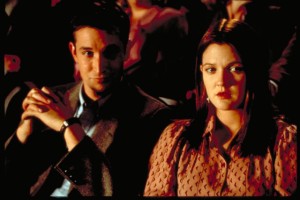
An impressive roster of known stars take bit parts in Donnie Darko.
While those supporting actors were having a lull in their careers at the time Darko was filmed, two stars were at their zenith. Noah Wyle was an actor hot on TV’s ER, and Drew Barrymore was riding high off her career resurgence in Scream.
Credit for this cast, and the film’s own creation, must be given more to Barrymore than Kelly. After Scream, Barrymore had begun a successful producing career with back-to-back hits Never Been Kissed and Charlie’s Angels. Kelly had no luck getting his film produced until Barrymore took on the project, and her involvement helped raise the $4.5 million budget and draw named talent to the project.
All of these elements combined to create an enjoyable movie viewing experience. But what was it about? I felt like I almost got it on my first viewing. Hours of reflection with Marjorie made us each realize a point, a line, which the other had missed.
We watched the film again the very next day, and I got a little more. My impression upon second viewing was that Donnie, a depressed and lonely boy, got to experience one month of happiness and reconnect with his family before he was destined to travel through time and die. I believe it was his destiny to die, but, thanks to unexpected time travel, his death is less tragic than it might have been.
I then spent the entire following day on the computer visiting the Donnie Darko website (no longer online but partially available via archive). Following the example set two years earlier by The Blair Witch Project; the Donnie Darko site was completely in-universe. I could read police reports about Donnie’s 1986 arrest for arson (briefly mentioned in the film), or the newspaper article about pedophile Cunningham’s suicide in the days after the film ends.
The site itself was as dense as the picture, with no obvious navigation. Animations played out on the screen and strange phrases appeared. As a gamer and web designer, the site sucked me in as much as the movie. It was designed perfectly from a psychological standpoint — I would click enough obscure links to get just a drip of information. Like a rat awaiting a treat I repeatedly pushed buttons. I sat at that computer all day, and I remember it well. I didn’t eat, I didn’t move, I just looked for more and more meaning.
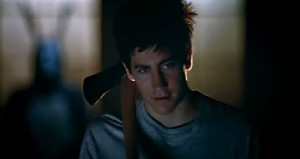
Donnie getting ready for school…
The site was filled with excerpts from the fictional book The Philosophy of Time Travel, written years ago by an old lady Donnie and his friends call “Grandma Death” (Patience Cleveland). The text talked about tangent universes, living receivers, the manipulated living, the manipulated dead, ensurance traps, and more dense terms. No, the site wasn’t here to give me clear answers, but it did aid in my interpretation.
Obsessed, I watched the movie again and this time I thought I had it. I could map the information in the site to the characters on screen. I had an explanation. I didn’t waver from my thought about Donnie experiencing happiness in his final days, but I did start to understand a little more about the mechanics of time travel in this movie, and how Frank the Bunny came to be.
Some may be right to say that films shouldn’t require hours of research to understand. To that I say it wasn’t required, it was desired. The film hooked me enough that I wanted to know more; I had my theories but for me it’s often more interesting to know the director’s vision and intent. Sometimes the intent is ambiguity, but other times they have many ideas but one “truth.”
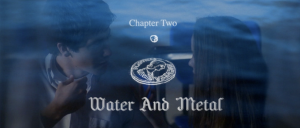
This is not a DVD menu or bonus feature. In the Donnie Darko director’s cut text is put on the screen to try and explain the film to the audience.
Finally, in 2004 I had the chance I missed in 2001 — to see Donnie Darko in theaters. Marjorie and I both drove to Chicago to see the limited release, joined by my Now Playing co-host Stuart, who had not yet seen the film.
The movie had been heavily edited between its Sundance premiere and its wide release. The director’s cut restored 20 minutes of footage, but made even more changes. In what I’m guessing was an attempt to be more accessible for mainstream audiences, Kelly added text to the screen — text taken straight from the Donnie Darko website.
There were other changes, including dialogue and music, but I felt adding the text was going a bit too far. In an effort to be less dense the director had created a weird movie experience that was akin to looking at an appendix while watching. I was happy with some of the scenes put back in the film, ecstatic to see it on the big screen, but in the end I prefer the original cut without the text. I liked the mental challenge of trying to piece this movie together on my own (Similarly, Lost Highway lost some of its appeal when the director went on record stating that film’s “truth”).
Having said that, I’m not certain that even with the text Donnie Darko is so clear-cut. For this review I re-watched the film for the first time in several years. I am a different person in 2014 than I was in 2012; as this review series indicates, I’m becoming more reflective about issues of life and mortality. In this viewing I saw a totally new interpretation of Donnie Darko, one that does involve time travel but also fate, destiny, and the will of God. When I took this as solely a sci-fi drama I missed the spiritual themes that permeate the movie.
In my original thesis, I believed that Donnie needed to connect and feel happiness before his death. But now I see the subtext about “God’s channel” — that Donnie had free will, he didn’t have to die, but to do so was to deny God. Donnie was having an existential crisis; his loneliness came in part because he didn’t want to die and he found no way to believe in anything more than this world. Through the experiences of this movie Donnie not only realizes his role is to die, but he knows it’s his choice to die. He could deny his fate, but in doing so he would deny God’s will. If God has will then there must be a God, and so, reassured and finally finding proof in divinity, Donnie laughs as he takes that next step into the afterlife.
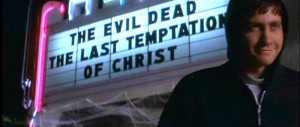
The viewer gets to pick which movie they see through various interpretations of Donnie Darko.
Yet, the more I ruminate on this movie, I would not say my interpretation is the only one. While I think it is what Kelly was going for, so many other interpretations are possible. I would be hard pressed to argue against a reading that Donnie is schizophrenic and having a psychotic episode, as his psychiatrist suggests. I read a theory online that Frank is like The Ghost of Christmas Future and no time travel actually happens, Frank just shows Donnie a vision of what could be. You could say this film is just a take on the theme of the Final Destination films — Donnie was supposed to die and, since he didn’t, Death surrounds him.
The alternate theory, though, that I think Kelly teases most is that there is no such thing as time travel, and this entire move is Donnie’s dream in the moments before his death, in the spirit of An Occurrence at Owl Creek Bridge. This is very clearly given as an option when Donnie and Gretchen go to a two-screen movie house. Do they choose The Evil Dead or The Last Temptation of Christ (which depicts such a dream-in-the-moment-before-death scenario)?
The film’s very final scenes, though, seem to indicate that others in town have a lingering memory, like an almost-forgotten dream in the night, of what Donnie experienced. That realization, that something happened to people other than Donnie, always returns me to my original theory: Donnie had to die, but he got to die after experiencing joy.
Even with this seemingly uplifting message, the movie is horribly sad. I well up every time during the film’s denouement. It’s set to a slow, somber cover of Tears for Fears’ “Mad World” sung by Gary Jules. I had never given that song’s bubble-gum pop lyrics much thought, but this version, mournful and soft, gave the words meaning I’d never considered. It’s the rare cover that makes all earlier versions of the song obsolete (though never, ever listen to the second version on the soundtrack where they added drums and other instrumentation. It is virtually ruinous to the perfect, minimalist recording).
A sequel to this film was released, S. Darko, telling an equally strange and surreal story about Donnie’s younger sister Samantha (Daveigh Chase). That film may contain more answers, but I refuse to see it. It was a studio made product with original creator Kelly having absolutely no involvement, insight, or approval. The director even took to social media to clarify that this was done without him. As such, I will never, ever watch this sequel, for my fear is that S. Darko won’t merely be terrible but, like the previously mentioned remix of “Mad World,” it will permeate my thoughts when I return to the original and ruin my enjoyment.
Donnie Darko changes every time I see it, or perhaps I change every time it sees me. It’s a film that has long moments of Donnie looking into a mirror, and perhaps that’s what I’m doing. In a film this impenetrable it’s easy to project your own thoughts and desires. What I do know is this is an absolute masterpiece of a film that everyone should watch.
When you do, share with me your theories. I’d love to hear them.
Tomorrow — 2002!
Arnie is a movie critic for Now Playing Podcast, a book reviewer for the Books & Nachos podcast, and co-host of the collecting podcasts Star Wars Action News and Marvelicious Toys. You can follow him on Twitter @thearniec

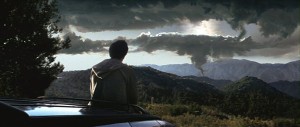
One of my favorites too! I love the atmosphere of the film and the ever changing ideas that come with reflecting on it. Mad World is such a perfect accompaniment to the film.
Great article. I’ve always loved this movie. As a single dad of three, whom all live with me, they know I hate most movies nowadays. Therefore I tend to make my three watch and appreciate movies that, though came out long before their time, are unlike most movies made now. Movies like Jaws, The Thing, Better Off Dead, The Breakfast Club, and Halloween. My kids are young but they do love all of these and because of their age, they can’t watch everything I own and love, but one movie I did show them, very recently, was the infamous Donnie Darko. With popcorn and the lights off, this was our movie for the night and after, we had a late dinner and discussed the film. I really wanted to know their reaction to it. Each of them had a different perspective of the film but they all loved it. Discussing this film was the best part, and because of the films ambiguity, it’s left completely open to interpretation. Very few films are made this way anymore. Even my 11 year old son loved guessing what was going on and why, my older daughter cried at the end, and my younger daughter threw her hands up frustrated upon seeing the credits, but she did want to see it again. And we have.
They don’t listen to the podcast but I do, and I’d love it (and I don’t think I’m alone here) if Now playing did a retrospective on these movies. Okay, maybe not the second film, but at least the first one. I’d love to hear each of your perspectives.
As for mine, I strongly feel Donnie was guided by a higher power.